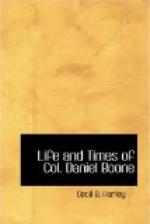It is almost impossible to conceive of the skill, coolness, and sagacity which enabled Daniel Boone to spend so many weeks in the midst of the Indians, and yet undiscovered by them. He appears to have changed his position continually—to have explored the whole centre of what forms now the State of Kentucky, and in so doing must have exposed himself to many different parties of the natives. A reader of Mr. Cooper’s Last of the Mohicans may comprehend, in some measure, the arts by which he was preserved; but, after all, a natural gift seems to lie at the basis of such consummate woodcraft; an instinct, rather than any exercise of intellect, appears to have guided Boone in such matters, and made him pre-eminent among those who were most accomplished in the knowledge of forest life. Then we are to remember the week’s captivity of the previous year; it was the first practical acquaintance that the pioneer had with the Western Indians, and we may be assured he spent that week in noting carefully the whole method of his captors. Indeed, we think it probable he remained in captivity so long that he might learn their arts, stratagems, and modes of concealment. We are, moreover, to keep in mind this fact: the woods of Kentucky were at that period filled with a species of nettle of such a character that, being once bent down, it did not recover itself, but remained prostrate, thus retaining the impression of a foot almost like snow—even a turkey might be tracked in it with perfect ease. This weed Boone would carefully avoid, but the natives, numerous and fearless, would commonly pay no regard to it, so that the white hunter was sure to have palpable signs of the presence of his enemies, and the direction they had taken. Considering these circumstances, it is even more remarkable that his brother should have returned in safety, with his loaded horses, than that he remained alone unharmed; though in the escape of both from captivity or death from January, 1770, until their return to the Atlantic rivers in March, 1771, there is something so wonderful that the old pioneer’s phrase, that he was “an instrument ordained to settle the wilderness,” seems entirely proper.
Daniel Boone’s own account of this period of his life, contained in his autobiography, is highly characteristic. It is as follows:
“Thus situated, many hundred miles from our families in the howling wilderness, I believe few would have equally enjoyed the happiness we experienced. I often observed to my brother, ’You see now how little nature requires to be satisfied. Felicity, the companion of content, is rather found in our own breasts than in the enjoyment of external things; and I firmly believe it requires but a little philosophy to make a man happy in whatsoever state he is. This consists in a full resignation to Providence, and a resigned soul finds pleasure in a path strewed with briers and thorns.’




